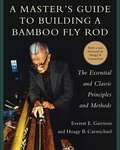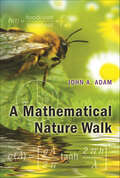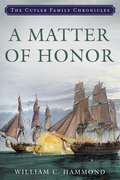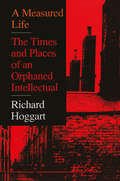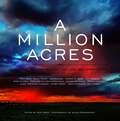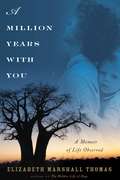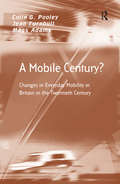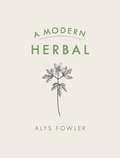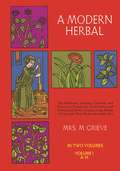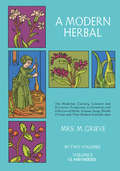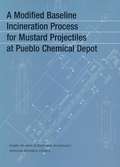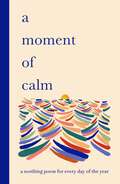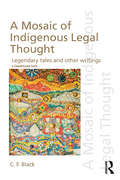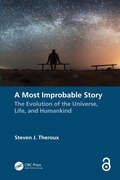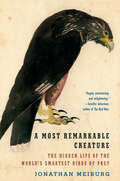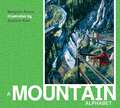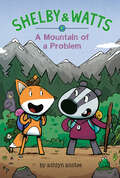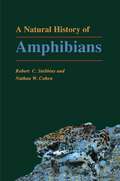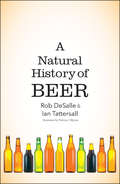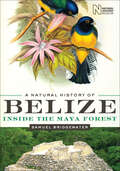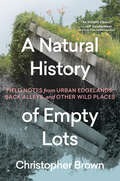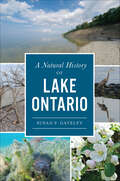- Table View
- List View
A Master's Guide to Building a Bamboo Fly Rod: The Essential and Classic Principles and Methods
by Hoagy B. Carmichael Everett E. GarrisonLearn the science and art of creating a one-of-a-kind bamboo fly rod.Fly fishing has a long and storied history. While many flyfishermen will find and purchase their favorite fly rod, there are those who desire to go a step further. For those discerning flyfishermen and women, simply buying a rod is not enough-they must build one. And just as fly fishing is an art, so is the creation of the bamboo fly rod.Many people believe that the best-feeling rods, particularly for trout fishing, are made from bamboo, and today’s bamboo rod-making tradition is particularly indebted to one man: Everett E. Garrison. Using principles he learned as an engineering student, Garrison created an exacting method of building rod-a method that for decades was a well-kept secret.These techniques are presented to the reader in A Master’s Guide to Building a Bamboo Fly Rod, a classic volume written by Hoagy B. Carmichael to honor and maintain Garrison’s legacy. Completely illustrated with black-and-white drawings and over three hundred and sixty black-and-white photographs, along with copious notes on the mathematical and engineering principles that underlie Garrison’s unique rod-making technique, this book will guide you through each step of creating a classic bamboo fly rod.Skyhorse Publishing is proud to publish a broad range of books for fishermen. Our books for anglers include titles that focus on fly fishing, bait fishing, fly-casting, spin casting, deep sea fishing, and surf fishing. Our books offer both practical advice on tackle, techniques, knots, and more, as well as lyrical prose on fishing for bass, trout, salmon, crappie, baitfish, catfish, and more. While not every title we publish becomes a New York Times bestseller or a national bestseller, we are committed to publishing books on subjects that are sometimes overlooked by other publishers and to authors whose work might not otherwise find a home.
A Mathematical Nature Walk
by John A. AdamHow heavy is that cloud? Why can you see farther in rain than in fog? Why are the droplets on that spider web spaced apart so evenly? If you have ever asked questions like these while outdoors, and wondered how you might figure out the answers, this is a book for you. An entertaining and informative collection of fascinating puzzles from the natural world around us, A Mathematical Nature Walk will delight anyone who loves nature or math or both. John Adam presents ninety-six questions about many common natural phenomena--and a few uncommon ones--and then shows how to answer them using mostly basic mathematics. Can you weigh a pumpkin just by carefully looking at it? Why can you see farther in rain than in fog? What causes the variations in the colors of butterfly wings, bird feathers, and oil slicks? And why are large haystacks prone to spontaneous combustion? These are just a few of the questions you'll find inside. Many of the problems are illustrated with photos and drawings, and the book also has answers, a glossary of terms, and a list of some of the patterns found in nature. About a quarter of the questions can be answered with arithmetic, and many of the rest require only precalculus. But regardless of math background, readers will learn from the informal descriptions of the problems and gain a new appreciation of the beauty of nature and the mathematics that lies behind it.
A Matter of Honor (Cutler Family Chronicles)
by William C. HammondThe first volume in a series of maritime novels set in the early years of the United States, A Matter of Honor is a dramatic account of a young man's coming of age during the American Revolution. Introducing Richard Cutler, a Massachusetts teenager with strong family ties to England, the novel tells his story as he ships out with John Paul Jones to avenge the death of his beloved brother Will, impressed by the Royal Navy and flogged to death for striking an officer. On the high seas, in England and in France, on the sugar islands of the Caribbean, and on the battlefield of Yorktown, Cutler proves his mettle and wins the love—and allegiance to the infant republic—of a beautiful English aristocrat from the arms of Horatio Nelson himself.
A Measured Life: The Times and Places of an Orphaned Intellectual
by Richard HoggartRichard Hoggart's book, The Uses of Literacy, established his reputation as a uniquely sensitive and observant chronicler of English working-class life. This pioneering work, first published in 1957, examines changes in the life and values of the English working class in response to mass media. It maps out a new methodology in cultural studies based around interdisciplinary and a concern with how textsin this case, mass publicationsare stitched into the patterns of lived experience. Mixing personal memoir with social history and cultural critique. The Uses of Literacy anticipates recent interest in modes of cultural analysts that refuse to hide the author behind the mask of objective social scientific technique. In its method and in its rich accumulation of the detail of working-class life, this volume remains useful and absorbing.
A Million Acres: Montana Writers Reflect on Land and Open Space
by James Grady Maile Meloy Keir Graff Rick Bass Jim Robbins Russell Rowland Carrie La Seur Jamie Harrison Joe Wilkins Christine Carbo Maxim Loskutoff Gwen Florio Janet Skeslien Charles Antonia Malchik Allen Morris Jones Caroline Patterson Eric Heidle Alexis Bonogofsky LeDoux Hansen Sterling HolyWhiteMountainMontana's stunning landscape shapes all who live here and all who visit. In twenty powerful pieces of writing—essays, memoirs, short stories—the state's finest contemporary writers explore the plains, rivers, and mountains of Big Sky Country. They show us how natural beauty and hardship are two sides of the same coin, and how sometimes the only way to cure heartache is to visit the great outdoors.From a hardscrabble upbringing to the pain of losing the family land, from death on a river to the awe of landing a big fish, from backcountry encounters with grizzly bears to an out-of-stater's happiness at making Montana her home, A Million Acres offers a wonderfully diverse range of experiences and perspectives. Framing these words are twenty-eight breathtaking photographs that render these open spaces in gorgeous color.Come to Montana: in words, in pictures, in person. And see what makes the Last Best Place worth saving.Contributors are:Rick BassMaile MeloyCarrie La SeurJoe WilkinsJim RobbinsGwen FlorioJamie HarrisonSterling HolyWhiteMountainJanet Skeslien CharlesMaxim LoskutoffChristine CarboJames Grady Alexis BonogofskyRussell RowlandCaroline PattersonKeir GraffEric HeidleLeDoux HansenAntonia MalchikAllen Morris Jones
A Million Years with You
by Elizabeth Marshall ThomasOne of our greatest literary naturalists turns her famed observational eye on herself in this captivating memoir. How is it that an untrained, self-taught observer and writer could see things that professional anthropologists often missed? How is that a pioneering woman, working in male-dominated fields, without sponsors or credentials, could accomplish more than so many more celebrated and professionally educated men could manage? How can we all unlock the wisdom of the world simply by paying close attention? With their intelligence and acute insight into other cultures and species, Elizabeth Marshall Thomas's many books have won a wide and loving audience. In A Million Years with You, this legendary author shares stories from her life, showing how a formative experience in South West Africa (now Namibia) in the 1950s taught her how to pay attention to the ancient wisdom of animals and humankind. As a young woman, Marshall Thomas joined her family on an anthropological expedition to the Kalahari Desert, where she conducted fieldwork among the Ju/wa Bushmen, later publishing her findings as The Harmless People. After college, a wedding, and the birth of two children, she returned to Uganda shortly before Idi Amin's bloody coup. Her skills as an observer and a writer would be put to the test on many other occasions working with dogs, cats, cougars, deer--and with more personal struggles. A Million Years with You is a powerful memoir from a pioneering woman, an icon of American letters.
A Mobile Century?: Changes in Everyday Mobility in Britain in the Twentieth Century (Transport and Mobility)
by Colin G. Pooley Jean Turnbull Mags AdamsFor most people in the developed world, the ability to travel freely on a daily basis is almost taken for granted. Although there is a large volume of literature on contemporary mobility and associated transport problems, there are no comprehensive studies of the ways in which these trends have changed over time. This book provides a detailed empirical analysis of mobility change in Britain over the twentieth century. Beginning with an explanatory theoretical overview, setting the UK case studies within an international context, the book then analyses changes in the journey to school, the journey to work, and travelling for pleasure. It also looks at the ways in which changes in mobility have interacted with changes in the family life cycle and assesses the impact of new transport technologies on everyday mobility. It concludes by examining the implications of past mobility change for contemporary transport policy.
A Modern Herbal
by Alys FowlerTHE BEST GARDENING BOOKS OF THE YEAR - GARDENS ILLUSTRATED'Informative and enthusiastic' i PaperPLANT-BASED MEDICINE FOR A CALMER, HEALTHIER LIFE It's easy to turn to the pharmacy when we're stressed, sick or feeling under the weather, but what if you turned to your garden instead?In this accessible and easy to use manual, horticultural expert, former Gardener's World presenter and Guardian columnist, Alys Fowler, shows how to take control of your health by adopting a more natural lifestyle. For thousands of years, people who had no access to clinical medicine knew how to boost their well-being by using the ingredients they found in plants. Herbs are the people's medicine; often freely available and abundant, they are ready and waiting to be plucked from around you to soothe and heal your body and mind. With guides for how to use and grow over 100 herbs - for example how to use fennel for indigestion, camomile for anxiety and nettle for hayfever - you'll soon be heading into the garden, rather than opening the medicine cabinet. Offering a fusion of botanical, practical, cultural and historical information, A Modern Herbal reveals how common herbs are the simple, cleansing way to better health and happiness.AS SEEN IN THE GUARDIAN'An important and accessible herbal for the 21st century . . . For anyone delving into herbs for the first time or those who want to broaden their herbal repertoire in the garden and home, this book is much needed' Gardens Illustrated
A Modern Herbal
by Margaret GrieveIf you want to know how pleurisy root, lungwort, and abscess root got their names, how poison ivy used to treat rheumatism, or how garlic guarded against the Bubonic Plague, consult A Modern Herbal. This 20th-century version of the medieval Herbal is as rich in scientific fact and folklore as its predecessors and is equally encyclopedic in coverage. From aconite to zedoary, not an herb, grass, fungus, shrub or tree is overlooked; and strange and wonderful discoveries about even the most common of plants await the reader.Traditionally, an herbal combined the folk beliefs and tales about plants, the medicinal properties (and parts used) of the herbs, and their botanical classification. But Mrs. Grieve has extended and enlarged the tradition; her coverage of asafetida, bearberry, broom, chamomile, chickweed, dandelion, dock, elecampane, almond, eyebright, fenugreek, moss, fern, figwort, gentian, Hart's tongue, indigo, acacia, jaborandi, kava kava, lavender, pimpernel, rhubarb, squill, sage, thyme, sarsaparilla, unicorn root, valerian, woundwort, yew, etc. — more than 800 varieties in all — includes in addition methods of cultivation; the chemical constituents, dosages, and preparations of extracts and tinctures, unknown to earlier herbalists; possible economic and cosmetic properties, and detailed illustrations, from root to bud, of 161 plants.Of the many exceptional plants covered in Herbal, perhaps the most fascinating are the poisonous varieties — hemlock, poison oak, aconite, etc. — whose poisons, in certain cases, serve medical purposes and whose antidotes (if known) are given in detail. And of the many unique features, perhaps the most interesting are the hundreds of recipes and instructions for making ointments, lotions, sauces, wines, and fruit brandies like bilberry and carrot jam, elderberry and mint vinegar, sagina sauce, and cucumber lotion for sunburn; and the hundreds of prescriptions for tonics and liniments for bronchitis, arthritis, dropsy, jaundice, nervous tension, skin disease, and other ailments. 96 plates, 161 illustrations.
A Modern Herbal: Vol. II
by Margaret GrieveIf you want to know how pleurisy root, lungwort, and abscess root got their names, how poison ivy used to treat rheumatism, or how garlic guarded against the Bubonic Plague, consult A Modern Herbal. This 20th-century version of the medieval Herbal is as rich in scientific fact and folklore as its predecessors and is equally encyclopedic in coverage. From aconite to zedoary, not an herb, grass, fungus, shrub or tree is overlooked; and strange and wonderful discoveries about even the most common of plants await the reader.Traditionally, an herbal combined the folk beliefs and tales about plants, the medicinal properties (and parts used) of the herbs, and their botanical classification. But Mrs. Grieve has extended and enlarged the tradition; her coverage of asafetida, bearberry, broom, chamomile, chickweed, dandelion, dock, elecampane, almond, eyebright, fenugreek, moss, fern, figwort, gentian, Hart's tongue, indigo, acacia, jaborandi, kava kava, lavender, pimpernel, rhubarb, squill, sage, thyme, sarsaparilla, unicorn root, valerian, woundwort, yew, etc. — more than 800 varieties in all — includes in addition methods of cultivation; the chemical constituents, dosages, and preparations of extracts and tinctures, unknown to earlier herbalists; possible economic and cosmetic properties, and detailed illustrations, from root to bud, of 161 plants.Of the many exceptional plants covered in Herbal, perhaps the most fascinating are the poisonous varieties — hemlock, poison oak, aconite, etc. — whose poisons, in certain cases, serve medical purposes and whose antidotes (if known) are given in detail. And of the many unique features, perhaps the most interesting are the hundreds of recipes and instructions for making ointments, lotions, sauces, wines, and fruit brandies like bilberry and carrot jam, elderberry and mint vinegar, sagina sauce, and cucumber lotion for sunburn; and the hundreds of prescriptions for tonics and liniments for bronchitis, arthritis, dropsy, jaundice, nervous tension, skin disease, and other ailments. 96 plates, 161 illustrations.
A Modified Baseline Incineration Process For Mustard Projectiles At Pueblo Chemical Depot
by National Research CouncilThe National Academies Press (NAP)--publisher for the National Academies--publishes more than 200 books a year offering the most authoritative views, definitive information, and groundbreaking recommendations on a wide range of topics in science, engineering, and health. Our books are unique in that they are authored by the nation's leading experts in every scientific field.
A Moment of Calm: A soothing poem for every day of the year
by Ana SampsonDiscover tranquility in A Moment of Calm, a beautifully curated anthology featuring a soothing poem for every day of the year. From classic verses to contemporary gems, this collection offers a daily respite from life's chaos. Editor Ana Sampson has carefully selected works that celebrate nature, explore inner peace, and inspire joy. Immerse yourself in Oscar Wilde's lyrical 'Impressions de Voyage', Mary Webb's reflective 'The Happy Life', and Edna St. Vincent Millay's pithy 'First Fig'. Seasonal entries like Robert Louis Stevenson's 'At Morning on the Garden Seat' mark nature's rhythms. With its elegant design and thoughtful illustrations, this book is the perfect bedside companion for poetry lovers and those seeking a moment of serenity. Embrace a year of poetic solace and find your daily moment of calm.
A Moment of Calm: A soothing poem for every day of the year
by Ana SampsonDiscover tranquility in A Moment of Calm, a beautifully curated anthology featuring a soothing poem for every day of the year. From classic verses to contemporary gems, this collection offers a daily respite from life's chaos. Editor Ana Sampson has carefully selected works that celebrate nature, explore inner peace, and inspire joy. Immerse yourself in Oscar Wilde's lyrical 'Impressions de Voyage', Mary Webb's reflective 'The Happy Life', and Edna St. Vincent Millay's pithy 'First Fig'. Seasonal entries like Robert Louis Stevenson's 'At Morning on the Garden Seat' mark nature's rhythms. With its elegant design and thoughtful illustrations, this book is the perfect bedside companion for poetry lovers and those seeking a moment of serenity. Embrace a year of poetic solace and find your daily moment of calm.
A Mosaic of Indigenous Legal Thought: Legendary Tales and Other Writings
by C.F. BlackThis book offers an Indigenous supplement to the rich and growing area of visual legal scholarship. Organized around three narratives, each with an associated politico-poetic reading, the book addresses three major global issues: climate change, the trade in human body parts and bio-policing. Manifesting and engaging the traditional storytelling mode of classical Indigenous ontology, these narratives convey legal and political knowledge, not merely through logical argument, but rather through the feelings of law and the understanding of lawful behaviour produced by their rhythm. Through its own performativity, therefore, the book demonstrates how classical Indigenous legal traditions remain vital to the now pressing challenge of making peace with the earth.
A Most Improbable Story: The Evolution of the Universe, Life, and Humankind
by Steven J. TherouxThis book is a "Big History" of the evidence regarding how we came to be. It briefly explores philosophical thought and how our past might affect our future. The text summarizes different perspectives, including the strengths and weaknesses of each. The genesis of our planet is explored, especially the circumstances that must exist for complex life to arise. This brief journey highlights the history of life, the emergence of simple lifeforms, and the evolution of complex creatures, including humans. The book concludes with a discussion of why other humanoids went extinct while our species achieved dominance. The author speculates on potentialities awaiting humankind and our planet. The first "Big History" written from the perspective of a biologist Summarizes multiple perspectives of history Documents the unique conditions for the emergence of life Speculates on the future
A Most Remarkable Creature: The Hidden Life and Epic Journey of the World's Smartest Birds of Prey
by Jonathan Meiburg&“A fascinating, entertaining, and totally engrossing story.&”—David Sibley, author of What It's Like to Be a Bird &“Utterly captivating and beautifully written, this book is a hugely entertaining and enlightening exploration of a bird so wickedly smart, curious, and social, it boggles the mind.&”—Jennifer Ackerman, author of The Bird Way &“As curious, wide-ranging, gregarious, and intelligent as its subject.&”—Charles C. Mann, author of 1491 An enthralling account of a modern voyage of discovery as we meet the clever, social birds of prey called caracaras, which puzzled Darwin, fascinate modern-day falconers, and carry secrets of our planet's deep past in their family history.In 1833, Charles Darwin was astonished by an animal he met in the Falkland Islands: handsome, social, and oddly crow-like falcons that were "tame and inquisitive . . . quarrelsome and passionate," and so insatiably curious that they stole hats, compasses, and other valuables from the crew of the Beagle. Darwin wondered why these birds were confined to remote islands at the tip of South America, sensing a larger story, but he set this mystery aside and never returned to it. Almost two hundred years later, Jonathan Meiburg takes up this chase. He takes us through South America, from the fog-bound coasts of Tierra del Fuego to the tropical forests of Guyana, in search of these birds: striated caracaras, which still exist, though they're very rare. He reveals the wild, fascinating story of their history, origins, and possible futures. And along the way, he draws us into the life and work of William Henry Hudson, the Victorian writer and naturalist who championed caracaras as an unsung wonder of the natural world, and to falconry parks in the English countryside, where captive caracaras perform incredible feats of memory and problem-solving. A Most Remarkable Creature is a hybrid of science writing, travelogue, and biography, as generous and accessible as it is sophisticated, and absolutely riveting.
A Mountain Alphabet (ABC Our Country)
by Margriet RuursMountains are an impressive sight anywhere in the world but those of the western mountain region of North America offer riches that are truly unique. This lavishly illustrated picture book presents snowcapped peaks, emerald lakes, tall pines and magnificent maples, and a range of birds and animals that will fill readers of all ages with wonder.The treasures and mysteries of nature are depicted in twenty-six full-color paintings, each with a line of alliterative text. Objects that begin with that letter of the alphabet are waiting to be discovered in each illustration. Complete with detailed information about each setting painted, this is a visually and mentally stimulating experience – from A to Z.
A Mountain of a Problem (Shelby & Watts #2)
by Ashlyn AnsteeMystery-solving duo Shelby & Watts are back on the trail! They're saving the environment, one case at a time.Violet the bear has awoken early from her hibernation, but she doesn&’t know why. She&’s called on Shelby & Watts to solve the case before her son, Theodore, is roused from his hibernation, too. With Shelby&’s deductive skills and Watts&’s scientific know-how, they&’ll leave no stone unturned or question unanswered.In this follow-up to Tide Pool Troubles, our two environmental detectives uncover the larger issue underlying Violet's early start to spring: climate change. With accessible language and tips for what readers can do in the face of environmental change, this is a gentle introduction to one of today's most pressing issues.
A Nation of Parks (Into Reading, Level T #15)
by Kristin CashoreNIMAC-sourced textbook. Read all about the National Park Service and the parks under its care. Find out how many national parks there are, where they are, and what makes each of them special. Then you can plan which one you want to visit first!
A Natural History of Amphibians
by Robert C. Stebbins Nathan W. CohenThis is a book for all readers who want to learn about amphibians, the animal group that includes frogs, toads, salamanders, and caecilians. It draws on many years of classroom teaching, laboratory experience, and field observation by the authors. Robert Stebbins and Nathan Cohen lead readers on a fascinating odyssey as they explore some of nature's most interesting creatures, interspersing their own observations throughout the book. A Natural History of Amphibians can serve as a textbook for students and independent learners, as an overview of the field for professional scientists and land managers, and as an engaging introduction for general readers. The class Amphibia contains more than 4,500 known living species. New species are being discovered so rapidly that the number may grow to more than 5,000 during our lifetimes. However, their numbers are being rapidly decimated around the globe, largely due to the encroachment of humans on amphibian habitats and from growing human-caused environmental pollution, discussed at length in the final chapter. The authors focus our attention on the "natural history" of amphibians worldwide and emphasize their interactions with their environments over time: where they live; how they reproduce; how they have been affected by evolutionary processes; what factors will determine their destinies over time. Through the experienced eyes of the authors, who are skilled observers, we come to see and understand the place of amphibians in the natural world around us.
A Natural History of Beer
by Ian Tattersall Rob DeSalleA celebration of beer—its science, its history, and its impact on human culture What can beer teach us about biology, history, and the natural world? From ancient Mesopotamian fermentation practices to the resurgent American craft brewery, Rob DeSalle and Ian Tattersall peruse the historical record and traverse the globe for engaging and often surprising stories about beer. They explain how we came to drink beer, what ingredients combine to give beers their distinctive flavors, how beer’s chemistry works at the molecular level, and how various societies have regulated the production and consumption of beer. Drawing from such diverse subject areas as animal behavior, ecology, history, archaeology, chemistry, sociology, law, genetics, physiology, neurobiology, and more, DeSalle and Tattersall entertain and inform with their engaging stories of beer throughout human history and the science behind it all. Readers are invited to grab a beer and explore the fascinating history of its creation.
A Natural History of Belize: Inside the Maya Forest (Corrie Herring Hooks Series)
by Samuel BridgewaterBelize’s Chiquibul Forest is one of the largest remaining expanses of tropical moist forest in Central America. It forms part of what is popularly known as the Maya Forest. Battered by hurricanes over millions of years, occupied by the Maya for thousands of years, and logged for hundreds of years, this ecosystem has demonstrated its remarkable ecological resilience through its continued existence into the twenty-first century. Despite its history of disturbance, or maybe in part because of it, the Maya Forest is ranked as an important regional biodiversity hot spot and provides some of the last regional habitats for endangered species such as the jaguar, the scarlet macaw, Baird’s tapir, and Morelet’s crocodile. A Natural History of Belize presents for the first time a detailed portrait of the habitats, biodiversity, and ecology of the Maya Forest, and Belize more broadly, in a format accessible to a popular audience. It is based in part on the research findings of scientists studying at Las Cuevas Research Station in the Chiquibul Forest. The book is unique in demystifying many of the big scientific debates related to rainforests. These include “Why are tropical forests so diverse?”; “How do flora and fauna evolve?”; and “How do species interact?” By focusing on the ecotourism paradise of Belize, this book illustrates how science has solved some of the riddles that once perplexed the likes of Charles Darwin, and also shows how it can assist us in managing our planet and forest resources wisely in the future.
A Natural History of Belize: Inside the Maya Forest (Corrie Herring Hooks Series)
by Samuel BridgewaterBelize's Chiquibul Forest is one of the largest remaining expanses of tropical moist forest in Central America. It forms part of what is popularly known as the Maya Forest. Battered by hurricanes over millions of years, occupied by the Maya for thousands of years, and logged for hundreds of years, this ecosystem has demonstrated its remarkable ecological resilience through its continued existence into the twenty-first century. Despite its history of disturbance, or maybe in part because of it, the Maya Forest is ranked as an important regional biodiversity hot spot and provides some of the last regional habitats for endangered species such as the jaguar, the scarlet macaw, Baird's tapir, and Morelet's crocodile. A Natural History of Belize presents for the first time a detailed portrait of the habitats, biodiversity, and ecology of the Maya Forest, and Belize more broadly, in a format accessible to a popular audience. It is based in part on the research findings of scientists studying at Las Cuevas Research Station in the Chiquibul Forest. The book is unique in demystifying many of the big scientific debates related to rainforests. These include "Why are tropical forests so diverse?"; "How do flora and fauna evolve?"; and "How do species interact?" By focusing on the ecotourism paradise of Belize, this book illustrates how science has solved some of the riddles that once perplexed the likes of Charles Darwin, and also shows how it can assist us in managing our planet and forest resources wisely in the future.
A Natural History of Empty Lots: Field Notes from Urban Edgelands, Back Alleys, and Other Wild Places
by Christopher BrownAn "instant classic", this genre-bending blend of naturalism, memoir, and social manifesto is a fascinating study for rewilding the city, the self, and society (Jeff VanderMeer, New York Times bestselling author). During the real estate crash of the late 2000s, Christopher Brown purchased an empty lot in an industrial section of Austin, Texas. The property—abandoned and full of litter and debris—was an unlikely site for a home. Brown had become fascinated with these empty lots around Austin, so-called &“ruined&” spaces once used for agriculture and industry awaiting their redevelopment. He discovered them to be teeming with natural activity, and embarked on a twenty-year project to live in and document such spaces. There, in our most damaged landscapes, he witnessed the remarkable resilience of wild nature, and how we can heal ourselves by healing the Earth. Beautifully written and philosophically hard-hitting, A Natural History of Empty Lots offers a new lens on human disruption and nature, offering a sense of hope among the edgelands. &“Brown lives far from any conventional battlefield, but he is surrounded by the wreckage of a different war, and he, too, finds hope in cultivating the ruins of nature…A Natural History of Empty Lots is less a departure from the nature writing tradition than a welcome addition to its edgelands.&” —New York Review of Books "The nature writing we need now." —Michelle Nijhuis, author of Beloved Beasts"Incredible" —Kelly Link, Pulitzer Prize finalist
A Natural History of Lake Ontario (Natural History)
by Susan P. GateleyFormed by glaciers more than twelve thousand years ago, Lake Ontario has captivated nature lovers for generations. Unique among the Great Lakes for having once been connected to the sea, fossils from ocean life have been found near the lake's shores. Damage done to Lake Ontario's ecosystem from centuries of human activity was center stage in the fight to pass the Clean Water Act and the restoration that followed. From incredibly diverse bird migrations in the spring and fall to the squalls and lake effect snow in winter, each season offers a rich ecological tapestry. Author Susan P. Gateley charts the natural history of Lake Ontario from its ice age origins to the climate and habitat challenges it faces today.
